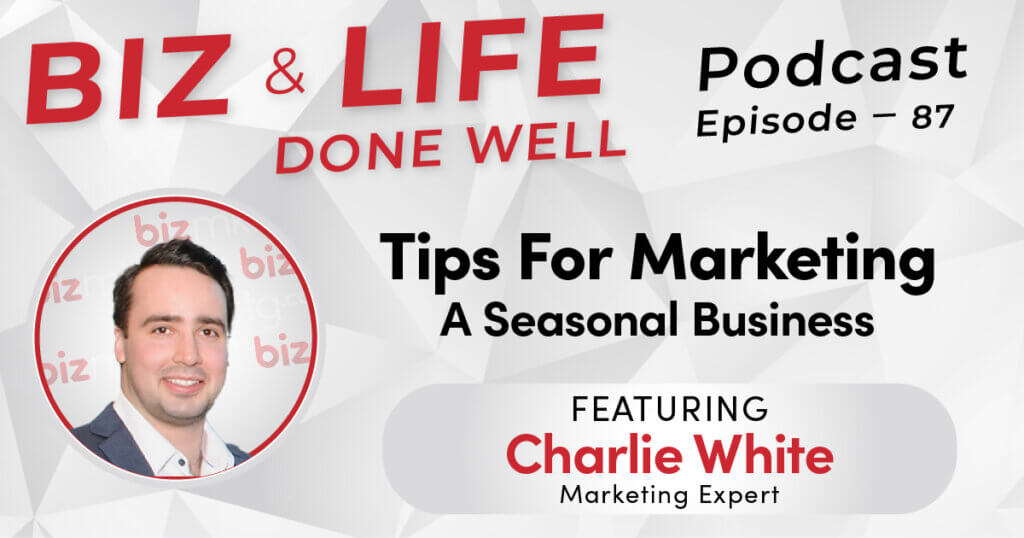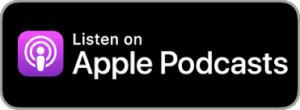Title: Tips For Marketing A Seasonal Business
Guest: Charlie White
Peter: Today, I am joined by Charlie White. He is a marketing agency owner of Site and Search Setup. Charlie, how are doing today?
Charlie: Doing well, Pete. Thank you for having me.
Peter: You survived your first podcast, and you’re on the number two.
Charlie: I think I made it past the tryout.
Peter: You did. Our engineer said you sounded great.
Charlie: You may sound even better.
Peter: Today, we’re talking about businesses that are impacted by seasonality. What should you do in your marketing if your business has a huge seasonal component? What types of business were we thinking about?
Charlie: So I got roofing, painting, HVAC, and log cabins, but just in general, the types of contractors who were working outside.
Peter: So home service contractors. So what is the dilemma here? What’s the problem that we’re trying to solve for these guys?
Charlie: So a lot of these businesses, they really fill up during the summer. And so once the winter turns or once the fall comes, they don’t really have a plan for when either service starts to lull in the winter or everybody tries to squeeze that service in the fall. And so what happens to a lot of these people HVAC, for example, is people need their heating working before the weather really turns nasty and there’s a big rush of calls. They’re overwhelmed. So it’s preparing for these rushes, the ebbs and flows of season work and making sure that you can stay as consistent through seasons as you can.
Peter: If we just step through a few of the businesses that I’ve seen and the dilemmas they see, we work in our agency with a lot of home service contractors. So roofing companies in the middle of the winter, they’re primarily focused on repair work. There’s a big windstorm here in the Northwest, blows a lot of the shingles off the house, and then they’ve got to come in and repair the roof or they discover a leak in the roof. So that’s repair work season. That’s not really what most roofing companies want to be doing.
You mentioned HVAC. One of the things we’ve seen is as soon as it gets cold and everybody’s heater furnace kicks in, that’s when they discover there’s an issue. Are scrambling to get their heater fixed. Then painting companies, that’s a little different. They just simply can’t paint necessarily in the middle of the year.
So they’re going to have to move inside. What we wanted to talk about, if you own one of these businesses, sees a lot of seasonality, what can you do with respect to your marketing to even things out? Let’s say that we’re heading into winter. What’s something that you’re going to look at as a business owner?
Charlie: The shift really needs to turn to a more proactive marketing approach. Months before the seasons turn, most people aren’t thinking, Hey, the weather’s gonna be bad and in two months, I’ll really need my heater working, for example. Right. As somebody who lives and breathes back, you know that. Your livelihood depends on that, and so it’s important that the business is more proactive than the customers are going to be.
Your marketing needs to shift to start focusing on what’s coming. So send out to your marketing lists, hey, we’ve seen this year after year, furnaces don’t turn back on in the winter when they’re supposed to. Make sure that yours is checked before that season turns, and so you don’t miss out because we’re totally swamped with business.
Peter: Make sure
Charlie: you get yours checked out now.
Peter: You may even want to offer a special incentive to do it now, to get your furnace checked out early, avoid the rush, so to speak. Yeah.
Charlie: It’s just trying to flatten the first week that it typically happens. Try to spread that.
Peter: Another thing that I was thinking about was if I was a HVAC company and I was running Facebook ads, for example, I would be running ads, even though it’s just the last part of the summer now, I would be running ads, hardcore focus on fall and bad weather in the pictures of my ads, just to remind people, Hey, winter’s coming. It ain’t going away. Have to remind people and get them thinking about what’s going to happen. We all know. Right?
But right now we’re sitting here, it’s not quite Labor Day and we’re all thinking about it. Last summer, woo hoo. I know you work with some folks that work in the log cabin field. That seems to me like it would be highly seasonal.
Charlie: Yeah. It more or less dries up in the winter. And so how can you use that time where you’re not outdoors working on log homes? How can you use that time to reflect on the past year, make sure that, hey, this is how our marketing performed, this is where we did well, and then use those insights to build a strategy for the next year. And so what you mentioned is for somebody like a log home restoration project, it’s quite expensive.
It takes quite a lot of forethought. And so that buying cycle is quite a bit longer. To get ahead of that long buying cycle, start it in the winter when you’re not quite busy yet, but you’re trying to reach customers and say, Hey, get your project started now. We’ll be able to get outside in June, but we know that these things take time. So let’s start now.
That way you can maximize the length of May to September.
Peter: If you’re one of those types of businesses that’s like in the home services industry, but it’s more discretionary, then something like that might be worth highlighting, as you pointed out when we were talking earlier, work that you’ve done during the season. So it’s a great time to send out an email or a series of emails. I wouldn’t just do it in one blast. Maybe once a week or once every other week, you’re sending an email out to your prospects that shows the projects that you just wrapped up in the past season. So you could really highlight that maybe with a little bit of a before picture, a lot of after picture, especially if it’s something that deals with the aesthetics and design of the living environment.
I would think the same, like a outdoor painting company could do the same thing. Right? This applies to them. It’s a little more discretionary, and it’s a great time to get people thinking about what are the possibilities. And again, it’s a great opportunity for you to toot your horn because you can show all the work you just did.
Charlie: Yeah. Be proud of it. And if you can if you can get those people who thought hiring you this past summer, but just missed out, then maybe you can get them to sign up for next next March, next April. And so then the earlier you could start, the further ahead you can get, the smoother your next season’s going
Peter: to be. Yeah, that’s a great point. So what we talked about was approaching folks who didn’t sign up. You knew they were pretty warm, but for whatever reason they didn’t. Encourage them to get on the calendar for season.
And in fact, maybe offer an incentive of some type for them to get on the calendar, maybe put in a deposit depending on the type of business you are and got a pretty good opportunity to prime the pump at that time. Because the challenge is that sometimes you get people who don’t think about actually pulling the trigger on a new project until it’s like the perfect time to do it, but it’s actually kind of late to get. So one other thing that I was thinking about Charlie was using remarketing ads. So if you’ve got people that visited your website, you could use not only email that, you you should have collected their email. So you have that opportunity, people who you’ve interacted with, but also people may have just come to your website and they may, you might not have their email address, but what you would be able to do would be to put out remarketing ads on Google, and that’s using the cookie that gets set when they visit your website.
There’s something that goes into their browser, and then you can actually serve ads to folks using that. And that’s really a powerful tool because with Google, you can do five forty days. You have an audience of people who have visited your website in the last five forty days.
Charlie: Yeah. And they’re not going to come looking for you to prepare for the season to change. And so remarketing ad is another good way to to be proactive in your marketing. They might have looked in June for your services, but they don’t know that they’ll need you in October as well.
Peter: Exactly. And
Charlie: so it’s yeah. It’s just another chance to go reach out to them because they’re not going to look for you before they need it.
Peter: The real message here that we’re trying to convey is think about the seasonality of your business in the same way that your customers might wait until the last minute. You should not wait the last minute. I can’t tell you how many times they get a phone call from a customer. We’ve warned them, we know it’s going to slow down. You should be doing something ahead of time.
It’s like after the slowdown, they’re contacting me to do something with their marketing. Sure, they might be able to catch up, but they’re never going to be to a point where they would have been if they had thought about it sooner. So look at the calendar in your business and just think about the seasonality that impacts your business and how you can get ahead of it in terms of your marketing and your sales efforts and incentives that you’re offering customers. I think you’ll find your marketing will be much more effective and you actually can get ahead of your competition as well if you take the time to figure out what you should be doing when.
Charlie: And I just wanna reiterate too. It’s not only about avoiding the lulls. If you’re a painter and you get so many people calling you in June that you can’t help them all, that could be avoided by scheduling those people in March.
Peter: We were talking earlier. We had a heat wave in Seattle a couple years ago, and it was like 108 degrees. And you said that you’re living in this house, and the HVAC went out, the guy finally shows up, this is my eighteenth call today or something. Guy’s getting run ragged. You not only want to increase the business in the lows, smooth it out in the peaks.
Obviously, roofers need to do that as well. There’s so many businesses that could benefit from that, and it doesn’t take a whole lot of marketing effort to figure this stuff out.
Charlie: It’s all just about getting ahead.
Peter: Charlie, this has been a good conversation. I appreciate your time. Folks that are interested in learning more about getting ahead of their marketing, we’re offering a free consultation on our site bizmarketing.com. We also are offering a one page marketing plan as well. If you’re interested, book an appointment with us and we can walk you through that.
Charlie, if somebody’s interested in getting ahold of you for some marketing help and advice, what, how do they get in touch with you?
Charlie: Yeah. Go ahead and visit siteandsearchsetup.com. You can get in contact with me through there, either through the website or my email will be on there as well. And, yeah, love to just chat marketing and see what your business needs, and hopefully we can build a strategy from there.
Peter: Great. Thanks, Charlie.
Charlie: See you soon. Thank you, Pete.
Peter: Thanks for listening to this episode of Biz and Life Done Well with Peter Wilson. You can subscribe to us on iTunes, Google Podcasts, Spotify, and most of the other popular podcast platforms. Please tell your friends about us and leave us a review so even more people will find out about us. Thanks again. We’ll see you soon.



